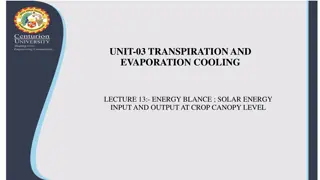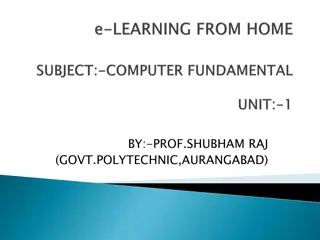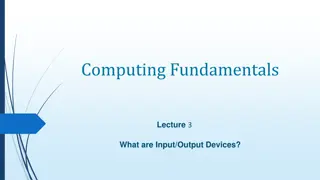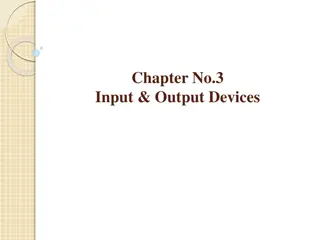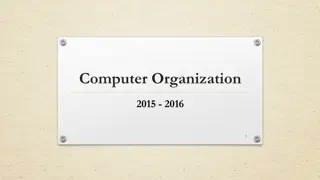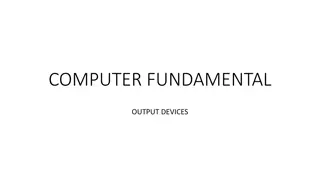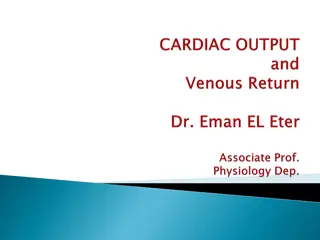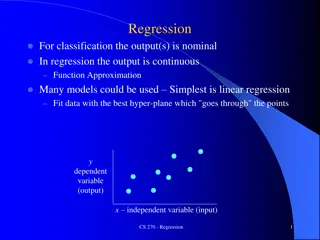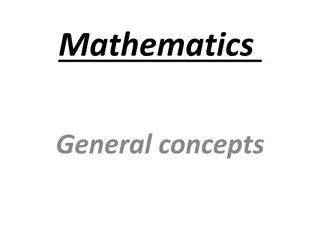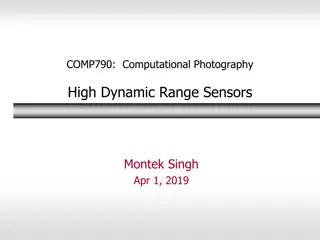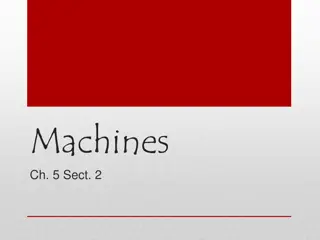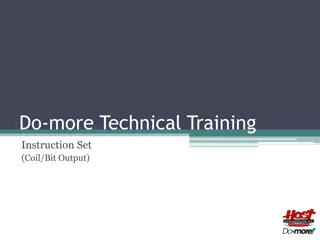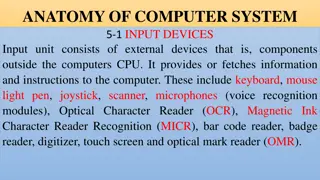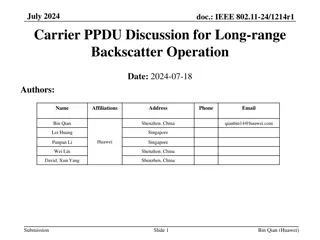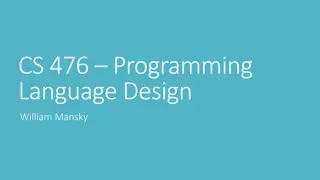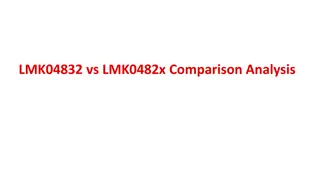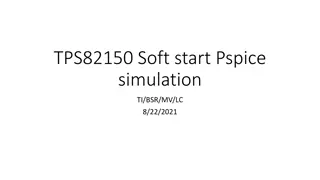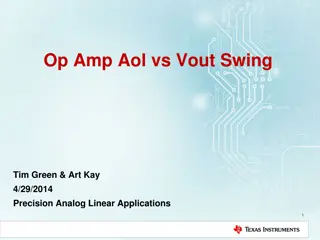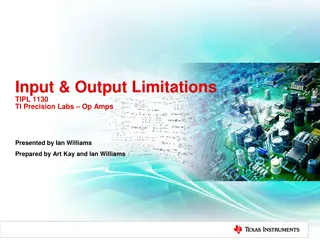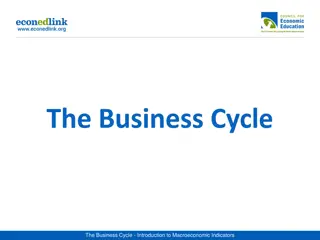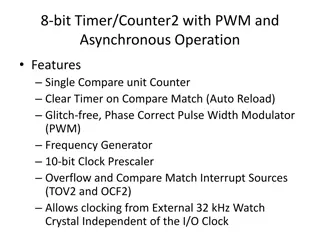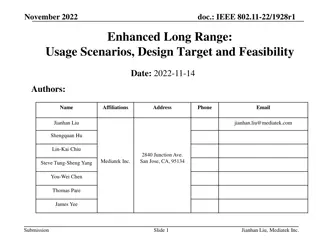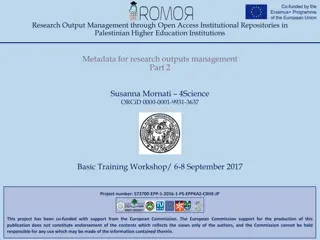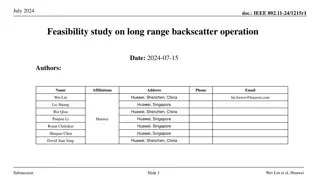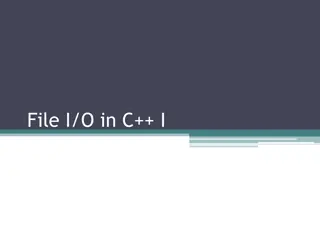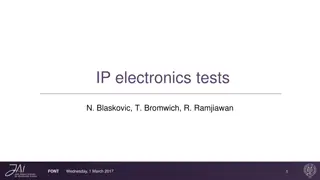Understanding Computer Hardware and Software Fundamentals
A computer is a programmable electronic device consisting of hardware and software that enables input, processing, storage, and output of information. This includes characteristics, basic components, application software, and advanced processing stages like ALU, input/output devices, control unit, R
0 views • 14 slides
Output Devices UNIT#4
Output devices in computing play a crucial role in displaying visual information to users. Monitors, including CRT, LCD, and LED types, provide visual output by showing pictorial forms on screens. Each type has distinct characteristics and resolutions. Graphics adapters help computers render graphic
1 views • 82 slides
Relevance of Countercyclical Fiscal Policy and Fiscal Acyclicality
This literature review examines the effectiveness of countercyclical fiscal policies in stabilizing output and enhancing welfare, with a focus on the correlation between public spending cycles and GDP cycles. The study analyzes examples from Sweden and Argentina to showcase the impact of fiscal poli
2 views • 29 slides
Solar Energy Balance in Crop Canopy: Understanding Input and Output
Solar energy plays a crucial role in the metabolic processes of plants, particularly in photosynthesis and transpiration. The input and output of solar energy at the canopy level impact the growth and productivity of crops, influenced by factors like leaf characteristics and plant density. Enhancing
3 views • 6 slides
Understanding Input-Output Models in Economics
Input-Output models, pioneered by Wassily Leontief, depict inter-industry relationships within an economy. These models analyze the dependencies between different sectors and have been utilized for studying agricultural production distribution, economic development planning, and impact analysis of i
8 views • 7 slides
Understanding the Production Function in Economics
The production function is a vital mathematical equation that determines the relationship between factors of production and the quantity of output. This function plays a crucial role in optimizing production efficiency by assisting in decision-making related to input levels, output quantities, and c
0 views • 9 slides
Understanding the Concept of Return to Factor in Production Economics
Return to Factor is a key concept in production economics that explains the relationship between variable inputs like labor and total production output. The concept is based on the three stages of production - increasing returns, diminishing returns, and negative returns. By analyzing the behavior o
0 views • 7 slides
Leveraging Digital Technology to Improve Agricultural Output and Food Security in Africa
In Africa, the challenge of food insecurity and malnutrition persists due to insufficient agricultural output and a poorly structured food environment. By embracing digital solutions, such as mobile technology and ICT-based innovations, the continent can enhance food systems, empower farmers, and wo
0 views • 10 slides
Understanding the Basics of Computer and Its Components
A computer is an electronic device that processes data input by the user to provide output results. It comprises components like ALU, CU, and MU, each with specific functions. The CPU acts as the brain of the computer, transforming raw data into information. The system's memory units, RAM and ROM, s
2 views • 12 slides
Understanding Input and Output Devices in Computing
In computing, input and output devices play a crucial role in enabling communication between users and computers. Input devices are used to enter data into a computer, while output devices display or provide the results of processed information. Common input devices include keyboards, mice, and joys
0 views • 17 slides
Understanding Computer Output Devices
Explore the world of computer output devices with a focus on monitors, printers, and flat-panel displays. Discover the different types of monitors, including CRT and flat-panel displays, along with their features and characteristics. Learn about the functionality of printers and the distinction betw
2 views • 27 slides
Determinants of Total Production in Macroeconomics
An economy's total production of goods and services (GDP) is influenced by the quantity of inputs, known as the Factors of Production, and the ability to transform inputs into output through the production function. The key factors of production are capital and labor, and the production function det
0 views • 37 slides
Understanding Basic Input/Output Operations in Computer Organization
Basic Input/Output Operations are essential functions in computer systems that involve transferring data between processors and external devices like keyboards and displays. This task requires synchronization mechanisms due to differences in processing speeds. The process involves reading characters
0 views • 11 slides
Understanding Electronic Components and Input/Output Devices
Explore the world of electronic components, input devices, and output devices through energy changes and symbol representations. Learn about LEDs, resistors, and energy conversions in a hands-on manner. Discover the role of various devices like microphones, solar cells, loudspeakers, and diodes in c
1 views • 24 slides
Understanding Output Devices in Computer Fundamentals
Output devices in computer systems play a crucial role by converting processed data into human-understandable forms such as text, images, audio, and more. They enable users to interact with computers effectively by displaying information through monitors, printing hard copies through printers, and p
0 views • 8 slides
Understanding Cardiac Output and Venous Return in Cardiovascular Physiology
Cardiac output, stroke volume, end-diastolic and end-systolic volumes play vital roles in cardiovascular function. Factors affecting cardiac output include physiological conditions and pathological states like hyperthyroidism and myocardial infarction. Venous return, controlled by mechanisms like Fr
0 views • 27 slides
Understanding Regression in Machine Learning
Regression in machine learning involves fitting data with the best hyper-plane to approximate a continuous output, contrasting with classification where the output is nominal. Linear regression is a common technique for this purpose, aiming to minimize the sum of squared residues. The process involv
1 views • 34 slides
Understanding Functions and Graphs in Mathematics
Functions are a fundamental concept in mathematics used to describe relationships in the real world. They can be represented through equations, graphs, tables, or verbal descriptions. A function maps elements from a domain to a range, where each input has a unique output. The domain encompasses all
0 views • 4 slides
Understanding High Dynamic Range Sensors in Computational Photography
Dive into the world of High Dynamic Range (HDR) sensors in computational photography with topics covering sensor architectures, CMOS sensing techniques, dynamic range evaluation, and basic concepts related to image sensors and pixel integrators. Explore the importance of dynamic range in capturing a
6 views • 33 slides
Association of Renal and Cerebral Near Infrared Spectroscopy with Low Cardiac Output in Single Ventricle Patients
Near-infrared spectroscopy (NIRS) has been studied in infants after Stage I palliation surgery to assess its association with low cardiac output and adverse outcomes. This retrospective study investigated postoperative cerebral and renal NIRS values in infants with single ventricle physiology. Resul
0 views • 13 slides
BSA Archery Range Master Training Overview
This presentation provides comprehensive training for becoming an Archery Range Master as outlined in the BSA National Shooting Sports Manual (2022 Edition). It covers a range of topics including safety guidelines, equipment review, range layout, archery shooting basics, training Cub Scouts, and fun
0 views • 115 slides
Understanding Machines: Work, Forces, and Efficiency
Machines play a vital role in making work easier by increasing force, distance, or changing the direction of applied force. Different types of machines like levers, pulleys, and inclined planes simplify work processes. Understanding input and output forces, as well as input and output work, is essen
1 views • 10 slides
BSA Archery Range Master Training Manual
Explore the comprehensive BSA National Shooting Sports Manual for Archery Range Master Training. This manual covers a range of topics including the history of archery, safety guidelines, equipment review, range layout, shooting basics, targets, scoring, whistle codes, and more. Get insights into the
1 views • 120 slides
Do-more Technical Training: Coil/Bit Output Instruction Set
Learn how to utilize the Coil/Bit Output Instruction Set in Do-more Technical Training. This set covers various functionalities including Unconditional END, Trailing Edge One-Shot, Output Reflection, Leading Edge One-Shot, Push On/Push Off, and Reset operations. Understand how each instruction works
0 views • 11 slides
Overview of Computer Input and Output Devices
Input devices of a computer system consist of external components like keyboard, mouse, light pen, joystick, scanner, microphone, and more, that provide information and instructions to the computer. On the other hand, output devices transfer information from the computer's CPU to the user through de
0 views • 11 slides
Carrier PPDU Discussion for Long-range Backscatter Operation in IEEE 802.11-24
This document discusses the use of Carrier PPDU for long-range backscatter operation in IEEE 802.11-24 standard. It covers topics such as close-range and long-range backscatter in AMP, reader PPDU for close-range operation, and different topologies to support long-range backscatter. The content incl
0 views • 14 slides
Understanding Input and Output in Programming: A Comprehensive Guide
This content provides detailed explanations and examples on input and output handling in programming, focusing on concepts such as I/O as State, typed output, and consuming input lists. It covers topics like using print statements, scanning inputs, and building output lists in programming languages.
0 views • 44 slides
Comparison Analysis of LMK04832 vs LMK0482x
General specifications comparison between LMK04832, LMK04828, LMK04821, and LMK04826 including parameters like VCO frequency range, maximum output frequency, input frequencies, PLL specifications, supply voltage, operating temperature, and output formats. Clock output formats, dividers, and delays d
0 views • 5 slides
Soft Start Simulation Results for TPS82150 Power Module
Results of soft start simulations for TPS82150 power module show that the rise time for output voltage slightly exceeds the expected soft start time due to voltage ramping up to 0.8V only. Different scenarios for input voltage and output current levels are explored, highlighting the impact on rise t
0 views • 4 slides
Understanding Op-Amp Output Swing Limitations in Linear Applications
Explore the limitations of op-amp output swing in linear applications, focusing on the non-linear behavior when driven into saturation. Learn how open-loop voltage gain affects output swing and the implications of operating closer to the rails. Check datasheet specifications for op-amp constraints a
0 views • 5 slides
Understanding Input and Output Limitations in Op Amps
Explore the various input and output limitations in TI Precision Labs Op Amps as presented by Ian Williams and prepared by Art Kay and Ian Williams. Delve into common mode voltage, voltage swing, data sheet parameters translation, input and output stages, examples of common mode voltage, and potenti
0 views • 15 slides
Understanding the Business Cycle in Macroeconomics
The business cycle refers to the fluctuations in an economy, with phases like peak, expansionary, trough, and contractionary. During expansionary phases, output increases, unemployment decreases, and inflation may rise. Conversely, contractionary phases see output decline, unemployment rise, and red
0 views • 6 slides
CMIP6 Output Requests and Atmosphere/Land Fields Overview
This presentation deck outlines the CMIP6 output request presented at ACME All-Hands meeting in June 2017. It includes detailed information on various atmosphere and land fields that are both part of and not part of the ACME output, covering parameters like radiation, moisture, carbon flux, and vege
0 views • 8 slides
Understanding Timing Models in Cell Design Environments
Delve into the intricacies of timing models for cells in design environments, exploring factors affecting delay, output transitions, linear and non-linear models, and the use of table models in cell libraries to specify delays and timing checks. Discover how input transitions and output capacitance
0 views • 11 slides
8-bit Timer/Counter2 with PWM and Asynchronous Operation
The 8-bit Timer/Counter2 with PWM and Asynchronous Operation features single compare unit, glitch-free operation, phase-correct PWM, frequency generator, clock prescaler, interrupt sources, and external clocking options. It includes registers for control, counter, output compare, asynchronous status
0 views • 14 slides
Enhanced Long Range WiFi Solutions for IoT and Video Surveillance Applications
Outdoor IoT and certain indoor applications require enhanced long-range WiFi solutions for improved efficiency and compatibility. Features like relay using multi-AP can extend ranges but are not cost-effective. The booming home security camera market also necessitates enhanced long-range solutions t
0 views • 13 slides
Research Output Management in PS Higher Education: FAIR Metadata Principles
Research output management in higher education focuses on making scholarly output findable, accessible, interoperable, and reusable through the implementation of FAIR metadata principles. The digital ecosystem surrounding scholarly publications faces barriers like fragmented repositories, varied app
0 views • 22 slides
Feasibility Study on Long-Range Backscatter Operation for IEEE 802.11-24
This document from July 2024 discusses the feasibility of long-range backscatter operation for IEEE 802.11-24, focusing on close-range and long-range backscatters in mono-static and bi-static setups. It evaluates the link budgets, downlink link budgets, and the use cases for both operations, emphasi
0 views • 11 slides
Understanding File Input/Output (I/O) in C++
File Input/Output (I/O) is an essential concept in C++ programming, allowing for interaction with files stored on secondary storage devices. This involves steps like including the fstream header file, declaring file stream variables, associating them with input/output sources, opening the file, perf
0 views • 19 slides
Anomalous IP Processing Electronics Diagnostic Tests
Repeating some anomalous IP processing electronics diagnostic tests on the first stage and the limiter. Tests include checking for unwanted harmonics in the frequency multiplier output and observing changes in the output power with varying input power. Issues with the output of the limiter diode and
0 views • 15 slides



